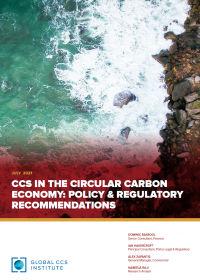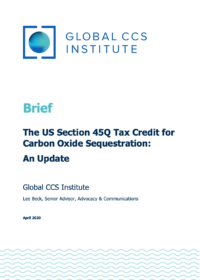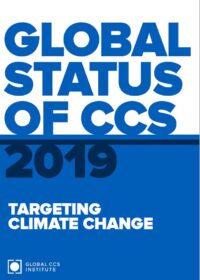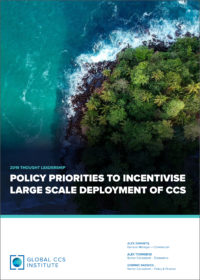Resources
Publications
Our publications, reports and research library hosts over 500 specialist reports and research papers on all topics associated with CCS.
View our Publication Library Disclaimer.
Filter by
CCS in the Circular Carbon Economy: Policy and Regulatory Recommendations
23rd July 2021
Topic(s): Carbon capture and storage (CCS), CCS finance, CCS investment, Policy law and regulation
CCS is one of many climate mitigating technologies that is mature, commercially available, and absolutely necessary to achieve global net-zero ambitions and a stable climate. The total installed CCS capacity must increase 100-fold by 2050 to limit global warming to below 2° Celsius.
This report summarises policy and legal factors that have a material impact on the investability of CCS projects and makes recommendations on how governments may facilitate greater private sector investment in CCS.
The report examines and covers:
- Financing CCS
- The development of CCS-specific legal and regulatory frameworks
- Recommendations addressing policy, finance and regulatory matters
Disclaimer
The content within the Global CCS Institute Publications, Reports and Research Library is provided for information purposes only. We make every effort and take reasonable care to keep the content of this section up-to-date and error-free. However, we make no claim as to its accuracy, currency or reliability.
Content and material featured within this section of our website includes reports and research published by third parties. The content and material may include opinions and recommendations of third parties that do not reflect those held by the Global CCS Institute.
Surveying the U.S. Federal CCS Policy Landscape in 2021
4th May 2021
Topic(s): Carbon capture and storage (CCS), CCS policy, Domestic policy, Policy law and regulation
2021 is proving to be a busy year for CCS policy in the United States. With the year not yet one third over, Members of the House of Representatives and Senate had already introduced five bipartisan bills that aim to accelerate the deployment of CCS. This brief details the contents of those bills and explains the rationale behind their policy proposals.
More broadly, though, Senior Advocacy & Communications Adviser, Matt Bright, uses this brief to examine the three pillars of CCS policy that undergird the advance of this technology in the U.S. In addition, this brief gives the reader a grand tour of U.S. CCS policy history from its inception to the present day in order to paint a complete picture of how strong policy can accelerate the deployment of CCS. In this way, the U.S. CCS policy landscape can be viewed as a lens to magnify the challenges and opportunities that lie ahead for global CCS deployment in the coming decades.
Disclaimer
The content within the Global CCS Institute Publications, Reports and Research Library is provided for information purposes only. We make every effort and take reasonable care to keep the content of this section up-to-date and error-free. However, we make no claim as to its accuracy, currency or reliability.
Content and material featured within this section of our website includes reports and research published by third parties. The content and material may include opinions and recommendations of third parties that do not reflect those held by the Global CCS Institute.
Carbon Removal with CCS Technologies
26th January 2021
Topic(s): Carbon capture and storage (CCS), Carbon removal, CCS policy, Negative emissions technologies, Policy law and regulation
With the transition to a low-carbon economy steadily underway, CCS is becoming recognised as a tool that complements the wide array of climate approaches being utilised to reach climate neutrality. The role of emission reductions and removals in the mitigation of climate change will change over time. It is widely agreed that emission reductions should be prioritised on the pathway to net zero. This, however, will change once net zero emissions are achieved; net zero is a point on the journey, not the final destination. Carbon removal will become the main driver of climate ambition in the second half of the century.
In this brief, Senior Policy Advisor with the Global CCS Institute, Eve Tamme, explains the dual role of CCS in climate change mitigation, and provides an overview of the two technological carbon removal approaches that use CCS: bioenergy with carbon capture and storage (BECCS) and direct air capture with carbon storage (DACCS). Along with highlighting the varied applications of CCS, this brief also includes a summary of ongoing challenges and opportunities tied to carbon removal related policy development.
Disclaimer
The content within the Global CCS Institute Publications, Reports and Research Library is provided for information purposes only. We make every effort and take reasonable care to keep the content of this section up-to-date and error-free. However, we make no claim as to its accuracy, currency or reliability.
Content and material featured within this section of our website includes reports and research published by third parties. The content and material may include opinions and recommendations of third parties that do not reflect those held by the Global CCS Institute.
The Role of CCS in the Paris Agreement and its Article 6
29th April 2020
Organisation(s): Global CCS Institute
Topic(s): Carbon capture and storage (CCS), Carbon markets, Carbon removal, Policy law and regulation
There has been a growing interest within the Institute’s membership – and elsewhere – in the opportunities to drive the deployment of CCS by the provisions of Article 6 of the Paris Agreement. This paper draws together all the latest information and thinking on the Article and its role in enabling countries to meet the objectives they have set themselves in their Nationally Determined Contributions (NDCs), with particular emphasis on how it can impact CCS.
The paper, authored by our Senior Policy Advisor Eve Tamme and Consultant John Scowcroft, provides insights into the history of Article 6, elaborates on how it can be an enabler for CCS, and looks into the upcoming developments in this field by answering the following questions:
• What does Article 6 do?
• What does Article 6 not do?
• Where is Article 6 in the international climate negotiations?
• What does Article 6 mean for CCS?
• What are the next steps?
Disclaimer
The content within the Global CCS Institute Publications, Reports and Research Library is provided for information purposes only. We make every effort and take reasonable care to keep the content of this section up-to-date and error-free. However, we make no claim as to its accuracy, currency or reliability.
Content and material featured within this section of our website includes reports and research published by third parties. The content and material may include opinions and recommendations of third parties that do not reflect those held by the Global CCS Institute.
Scaling up the CCS Market to Deliver Net-Zero Emissions
20th April 2020
Organisation(s): Global CCS Institute
Topic(s): Carbon capture and storage (CCS), CCS facilities, Policy law and regulation
Understanding how the CCS market is likely to develop over the coming years is of interest to a wide range of stakeholders. It can help inform the timing and design of policies introduced by governments, the scale of the market for potential investors, and the challenges associated with meeting long-term climate targets.
This report aims to inform the discussion on these topics by providing an overview of the near-term and longer-term developments in the CCS market.
It reviews the current CCS facility pipeline, and how that could change in the next few years given project lead-in times. It then considers how this compares to projections of the number of CCS facilities needed to meet long-term climate goals. Throughout the report the number of CCS facilities deployed is used as a proxy for the size of the CCS market.
Disclaimer
The content within the Global CCS Institute Publications, Reports and Research Library is provided for information purposes only. We make every effort and take reasonable care to keep the content of this section up-to-date and error-free. However, we make no claim as to its accuracy, currency or reliability.
Content and material featured within this section of our website includes reports and research published by third parties. The content and material may include opinions and recommendations of third parties that do not reflect those held by the Global CCS Institute.
The US Section 45Q Tax Credit for Carbon Oxide Sequestration: An Update
16th April 2020
Organisation(s): Global CCS Institute
Topic(s): Carbon capture use and storage (CCUS), Policy law and regulation
In February 2020, the US Internal Revenue Service published Notice 2020-12 and Revenue Procedure 2020-12, which include updated guidance regarding the Section 45Q Credit. Among other areas, this notice focuses on the eligibility requirements for the date of construction commencement and partnership structures.
Our Washington, DC-based Senior Advisor for Advocacy and Communications, Lee Beck, has prepared an Issue Brief on the latest developments.
Disclaimer
The content within the Global CCS Institute Publications, Reports and Research Library is provided for information purposes only. We make every effort and take reasonable care to keep the content of this section up-to-date and error-free. However, we make no claim as to its accuracy, currency or reliability.
Content and material featured within this section of our website includes reports and research published by third parties. The content and material may include opinions and recommendations of third parties that do not reflect those held by the Global CCS Institute.
Global Status of CCS: Brief for Policymakers
4th March 2020
Organisation(s): Global CCS Institute
Topic(s): Carbon capture and storage (CCS), Policy law and regulation
The Global CCS Institute is pleased to present a Brief for Policymakers: CCS - Targeting Climate Change.
The brief summarizes the key findings of the Institute's latest Global Status of CCS Report which documents a range of important milestones for CCS, its status across the world and the key opportunities and benefits the technology presents.
The Brief includes detailed information on:
- CCS and its role in climate mitigation
- CCS deployment around the world
- the role of policy in large-scale deployment and
- updates on the progress, projects, and policies globally.
We hope you enjoy it, share it with colleagues and look forward to working with you as we accelerate the deployment of carbon capture and storage globally.
Disclaimer
The content within the Global CCS Institute Publications, Reports and Research Library is provided for information purposes only. We make every effort and take reasonable care to keep the content of this section up-to-date and error-free. However, we make no claim as to its accuracy, currency or reliability.
Content and material featured within this section of our website includes reports and research published by third parties. The content and material may include opinions and recommendations of third parties that do not reflect those held by the Global CCS Institute.
The European Green Deal: New opportunities to scale up carbon capture and storage
27th February 2020
Organisation(s): Global CCS Institute
Topic(s): Carbon capture and storage (CCS), Carbon removal, Policy law and regulation
The recent reports of the Intergovernmental Panel on Climate Change (IPCC), and the Commission vision for a climate neutral Europe , have mobilised support for climate neutrality by 2050 by most EU Member States. Balancing sources and sinks by 2050, and from that point onwards achieving net negative emissions, can only be delivered through a major economy-wide transformation and by substantially stepping up the use of all climate change mitigation and carbon removal technologies. The European Green Deal as the new big European project is an enormous challenge but also an opportunity to lead by example and transform the European economy.
This overview takes a closer look at the European Green Deal with its extensive list of initiatives, and highlights what to watch out for in the coming days, months and years regarding low carbon technologies like carbon capture and storage (CCS). This paper explores how climate targets, governance, just transition, carbon border adjustment, industrial strategy, hydrogen, financing and infrastructure can support CCS technologies. The second part of the paper highlights the three main challenges for CCS in the existing legislation that need to be considered in the upcoming wave of revisions and new initiatives.
It’s a snapshot of where we are as of February 2020, with a list of initiatives and processes to choose from when engaging with policymakers and stakeholders.
This piece was authored by Eve Tamme, Senior Advisor for Climate Change Policy at the Global CCS Institute.
Disclaimer
The content within the Global CCS Institute Publications, Reports and Research Library is provided for information purposes only. We make every effort and take reasonable care to keep the content of this section up-to-date and error-free. However, we make no claim as to its accuracy, currency or reliability.
Content and material featured within this section of our website includes reports and research published by third parties. The content and material may include opinions and recommendations of third parties that do not reflect those held by the Global CCS Institute.
Global Status of CCS Report: 2019
9th December 2019
Topic(s): Carbon capture and storage (CCS), CO2 hubs, CO2 storage, CO2 transport, Policy law and regulation
The 2019 Global Status of CCS report documents important milestones for CCS over the past 12 months, its status across the world and the key opportunities and benefits the technology presents.
The report provides detailed information on, and analyses of, the global CCS facility pipeline, policy, CO2 storage and the legal and regulatory environment. In addition, four regional updates and a CCS Technology section further demonstrate global development and the versatility of CCS across a variety of applications and industry sectors.
Disclaimer
The content within the Global CCS Institute Publications, Reports and Research Library is provided for information purposes only. We make every effort and take reasonable care to keep the content of this section up-to-date and error-free. However, we make no claim as to its accuracy, currency or reliability.
Content and material featured within this section of our website includes reports and research published by third parties. The content and material may include opinions and recommendations of third parties that do not reflect those held by the Global CCS Institute.
The LCFS and CCS Protocol: An Overview for Policymakers and Project Developers
24th May 2019
Organisation(s): Global CCS Institute
Topic(s): Biofuels / Bioenergy, CCS protocol, Policy law and regulation, United States
The Global CCS Institute has launched a report analyzing California’s recently passed carbon capture and storage protocol. The report provides a summary of the regulation for project developers and policymakers in other states and countries, given the Protocol's global applicability. While comparing it to other relevant regulations – including the federal carbon capture tax credit also known as 45Q – the report seeks to raise awareness for the opportunities created through the protocol and to advance deployment opportunities.
The protocol incentivizes carbon capture and storage projects reducing the lifecycle emissions from bioethanol, hydrogen, and crude, provided the fuel is sold into the California market, as well as direct air capture projects globally.
With US CO2 emissions growth outpacing global emissions growth and many Americans already experiencing the impacts of climate change, policy makers in Washington have begun drafting policy statements and principles for comprehensive climate policy. A year after the US passed the most progressive carbon capture and storage incentive policy globally – a tax credit also known as 45Q – lawmakers are also looking to develop further policies to support the large-scale deployment of carbon capture and storage.
To support stakeholders, policy influencers, and lawmakers throughout the process of formulating carbon capture-supportive policies as well as more effectively communicate as advocates, the Global CCS Institute has commissioned a federal policy influencer survey in Washington, DC. The goal is to improve the understanding of support for climate action and carbon emissions reduction technologies such as carbon capture and storage. Polling 100 policy influencers, 50 from the private sector and 50 from the public sector, the survey provides insights into perceptions of the US energy transition, including the role of government, and the understanding of carbon capture technologies.
The results are encouraging: In pursuit of realistic climate solutions, policy influencers seem to have abandoned technology favoritism, an approach that has been strengthened by the Intergovernmental Panel on Climate Change’s Report on Global Warming of 1.5C released in October 2018. 64 percent of respondents answered that the future of US energy needs to include all forms of clean energy rather than just renewables or fossil fuels. There is also broad agreement among respondents that the US should pursue low-carbon technologies, and that all options must be on the table, albeit clean is the most important energy quality.
Disclaimer
The content within the Global CCS Institute Publications, Reports and Research Library is provided for information purposes only. We make every effort and take reasonable care to keep the content of this section up-to-date and error-free. However, we make no claim as to its accuracy, currency or reliability.
Content and material featured within this section of our website includes reports and research published by third parties. The content and material may include opinions and recommendations of third parties that do not reflect those held by the Global CCS Institute.
Policy priorities to incentivise large scale deployment of CCS
2nd April 2019
Topic(s): Business cases, Carbon capture use and storage (CCUS), Policy law and regulation
Carbon capture and storage (CCS) is essential to achieving climate change mitigation targets. It is the only feasible technology that can deliver deep emissions reductions in many industrial processes that are vital to the global economy, such as steel, cement and chemicals production. In combination with bioenergy used for power generation or biofuel production, it provides one of the few technologies that can deliver negative emissions at scale; unambiguously required to limit temperature rises to meet the Paris climate targets.
While the critical role of CCS has been demonstrated in many reports, the policies in place today are insufficient to ensure CCS deployment scales up at the rate required. This paper seeks to address the current policy gap by describing priorities for policymakers to support the transition from current to future rates of deployment of CCS.
The Institute's report explores how to stimulate investment in CCS. The paper also identifies concrete policy actions and reviews the progress achieved until now by identifying the policies and commercial conditions that have enabled investment in the 18 large-scale CCS facilities currently in operation, and the additional five that are under construction.
Disclaimer
The content within the Global CCS Institute Publications, Reports and Research Library is provided for information purposes only. We make every effort and take reasonable care to keep the content of this section up-to-date and error-free. However, we make no claim as to its accuracy, currency or reliability.
Content and material featured within this section of our website includes reports and research published by third parties. The content and material may include opinions and recommendations of third parties that do not reflect those held by the Global CCS Institute.











